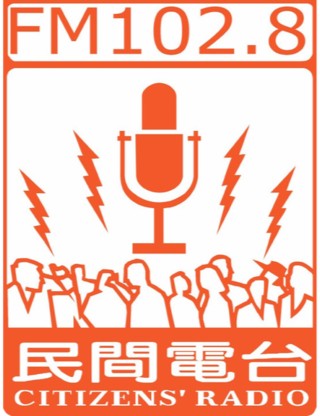Communications in Hong Kong includes a wide-ranging and sophisticated network of radio,television,telephone,Internet,and related online services,reflecting Hong Kong's thriving commerce and international importance.
Hong Kong's media consists of several different types of communications of mass media:television,radio,cinema,newspapers,magazines,websites and other online platforms.
TVB Jade,or simply Jade,is a Hong Kong Cantonese-language free-to-air television channel owned and operated by Television Broadcasts Limited (TVB) as its flagship service,alongside its sister network,the English-language TVB Pearl. Broadcasting started on 19 November 1967. It is headquartered at TVB City at the Tseung Kwan O Industrial Estate in Tseung Kwan O,in the Sai Kung District. Primarily broadcasting entertainment programming,TVB Jade has historically been the most dominant television channel in the region in terms of viewership,with its closest competitor having been the now-defunct ATV Home.

The 2000s in Hong Kong began a new millennium under the People's Republic of China (PRC).

Metro Broadcast Corporation Ltd. is one of Hong Kong's three radio broadcasting corporations. It was founded on 1 July 1991,and is owned by the Hong Kong-listed CK Hutchison Holdings.

The Communications Authority is a statutory body responsible for licensing and regulating the broadcasting and telecommunications industries in Hong Kong. It was formed in 2012 through a merger of the Hong Kong Broadcasting Authority,Television and Entertainment Licensing Authority,and the Telecommunications Authority. The organisation is authorized to investigate complaints made regarding programmes,issue warnings and fines,or even suspend the license of the radio or television station.

The Government Secretariat is the collective administrative headquarters of the Government of Hong Kong. It is collectively formed by the offices of the Chief Secretary and of the Financial Secretary as well as thirteen policy bureaux.
The Society For Truth And Light is a pressure group with an official mission of "address[ing] social ethics,media behaviour,and sex culture in Hong Kong" from a Christian Right point of view "to care the society and service people through research,monitoring,education and publishing."

Citizens' Radio was a radio station in Hong Kong established by pro-democracy camp figure Tsang Kin Shing. The station ran as a non-profit organization. It started trial broadcasting on 3 October 2005 on 102.8 MHz FM. The regular broadcasting hours were 7:00 pm–12:00 pm from Monday to Friday. The station ceased to operate on 30 June 2023,with Tsang saying that the station had had trouble inviting guests in view of "so many red lines" –an apparent reference to national security legislation –enacted in 2020,and that due to the blocking of a bank account for receiving donations,the station would be unable to pay rent beyond August.

Lai Tak Tsuen is a public housing estate at 2 –38 Lai Tak Tsuen Road,Tai Hang,Causeway Bay,Hong Kong. Built in 1975,it is one of the first public housing developments in Hong Kong. It was the second self-funded rental project of the Hong Kong Housing Society. The housing estate was named after a Hong Kong government officer,Michael Wright,who had served the Government of Hong Kong for more than 30 years.

Zhang Dejiang is a Chinese retired politician who served as the chairman of the Standing Committee of the National People's Congress between 2013 and 2018. He was also the third-ranking member of the Politburo Standing Committee of the Chinese Communist Party from 2012 to 2017.

Although Hong Kong law provides freedom of speech and press,and freedom of expression is protected by the Hong Kong Bill of Rights,the Hong Kong national security law gives the government the power to "take down any electronic messages published" that the government considers endangering national security. The government has blocked several anti-government,doxxing or politically sensitive websites after the commencement of the law,leading to increased concerns of Internet censorship.

Ir Albert Lai is the former Climate Strategy Leader of Deloitte China,the co-founder and CEO of Carbon Care Asia,a mission-driven business in carbon strategy and sustainability innovation. He is the founding chairman of The Professional Commons,an independent public policy think-tank and the Hong Kong People’s Council for Sustainable Development,as well as founding Vice-Chairman of the Civic Party. He also served as a member of the Commission on Strategic Development,and a member of the Strategy Sub-Committee,Council for Sustainable Development,Hong Kong SAR Government.

A trading fund is an executive agency,government department or often simply a part of a department,that enables the department to handle its own revenues and expenses separately from overall government finances and more like a business,as opposed to having to obtain funding from the government's legislature and feeding income back into its treasury. A Hong Kong parliamentary study of trading funds in the UK and Hong Kong describes their nature and purpose as follows:
A trading fund is a financial and accounting framework established by law to enable a government department,or part of a department,to adopt certain accounting and management practices common in the private sector. [The fund] operates on a self-financing basis and does not need to regularly seek funding from the legislature to finance its daily operations after its establishment... the intention [is that such] an institutional change would provide the appropriate flexibility in resource management and nurture a new working culture to improve services in terms of both quality and cost-effectiveness.

The Office of the Communications Authority (OFCA) is an executive arm of the Communications Authority in Hong Kong. It is the body responsible for telecommunications regulation,antitrust enforcement and allocation of the radio frequency portion of the electromagnetic spectrum.

The Commerce and Economic Development Bureau is a policy bureau of the Government of Hong Kong responsible for policy matters on Hong Kong's external commercial relations,inward investment promotion,intellectual property protection,industry and business support,tourism,consumer protection and competition,as well as broadcasting,film-related issues,overall view of creative industries,development of telecommunications,and control of obscene and indecent articles in Hong Kong.

The Kai Tak Development,abbreviated as "KTD" and formerly called South East Kowloon Development (東南九龍發展計劃),refers to the redevelopment of the former Kai Tak Airport site in Kai Tak,Kowloon,Hong Kong.
The Hong Kong Broadcasting Authority (HKBA) was an organisation responsible for licensing and regulating the broadcasting industry in Hong Kong. It was formed in 1987. The organisation was authorised to investigate complaints made regarding programmes,issue warnings and fines,or even suspend the license of the radio or television station.

The Secretary for Innovation,Technology and Industry,formerly Secretary for Innovation and Technology,is a Hong Kong Government position created in 2015 by the Leung Chun-ying government after years-long opposition of the pan-democracy camp.

HKT Limited,also known as Hong Kong Telecom,is one of the largest telecommunications companies in Hong Kong. It has a dominant position in fixed-line,mobile,IDD and broadband services in Hong Kong. HKT Group is a subsidiary of PCCW since 2000,after it was acquired from Cable &Wireless plc.














